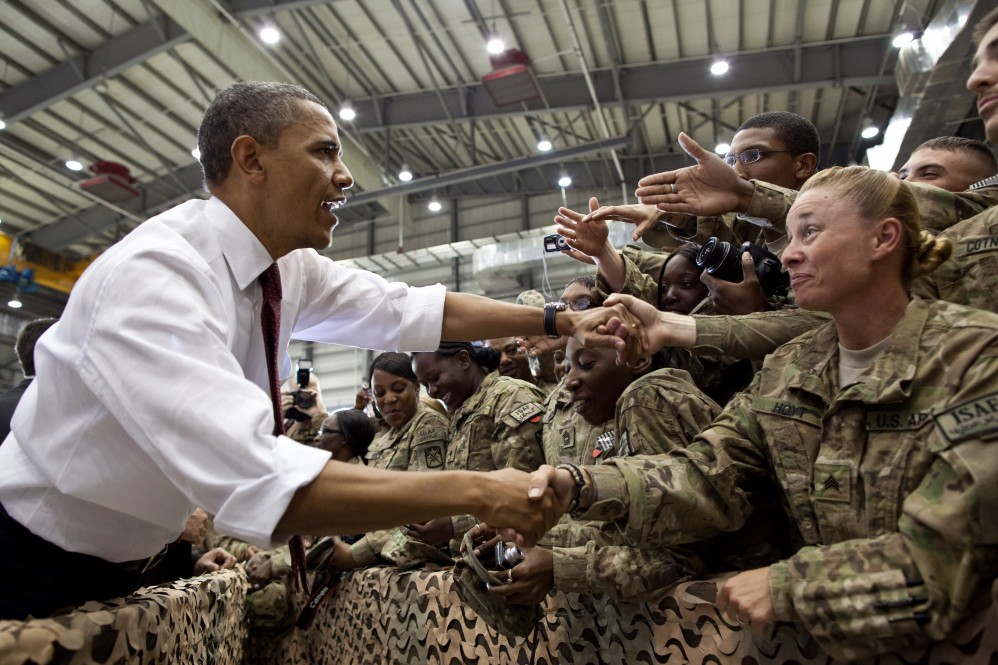
Yesterday, the President of the United States, Barack Obama, made a surprise visit to a U.S. military base in Afghanistan. He wanted to encourage the American troops. If established plans are followed, they will depart the central Asian nation at the end of this year—although it is not clear whether a small contingent will remain there after the withdrawal—when the government in Kabul will assume full responsibility for local security.
Begun in 2001 under the pretext of avenging the 9/11 terrorist attacks and continuing since then under the umbrella of the United Nations and NATO, Washington’s violent intervention in Afghanistan has gone on for 13 years—but the shared George W. Bush and Obama objective of destroying the fundamentalist Islamic organization called al-Qaida and its Afghan allies known as the Taliban has not yet been accomplished.
However, the armed conflict has left tens of thousands dead in the country, victims of the conflict as well as thousands of injured among the attacking forces and incalculable material losses. Apart from that, Afghanistan is far from being a peaceful nation. Unlike the Western military intervention, there is no end in sight to the violence perpetrated by the regime headed by Hamid Karzai and the terrorist groups he confronts.
By contrast, the military invasion and occupation has brought astronomical benefits to a handful of U.S. and European businesses dedicated to arms manufacturing, private security and infrastructure development.
Together with the Iraq invasion, which was initiated by Obama’s predecessor in 2003, the armed conflict in Afghanistan has been characterized by systematic human rights violations and a loss of the most basic ethical principles in the conduct of war, as shown by the files about both wars obtained by Chelsea Manning and freely divulged by Wikileaks at the end of 2010. In both wars, civilians have been victims of extrajudicial killings, torture, kidnapping and massacres. At the same time, various investigations have uncovered monumental corruption in the management of the U.S. war budget—corruption that has tainted the authorities in Kabul. Although the situation has seriously eroded the international image of the U.S. government and its allies, it has not been enough to decisively mobilize U.S. public opinion against the war still underway in Afghanistan.
The systematic use of drones by the occupiers in their operations is an especially troubling aspect of the U.S. military presence in the central Asian country. Drones have caused thousands of civilian casualties and their use should be considered a crime against humanity responsibility for which falls mainly on Obama. Since 2008, before he arrived at the White House, Obama announced that he would end the intervention in Iraq to concentrate on Afghanistan. His administration has been a staunch defender of using these supposedly intelligent weapons. But, judging from the social tragedy they cause, they are not actually very intelligent.
It is difficult to accurately calculate the number of victims because the attacks are carried out in remote areas that have no media coverage, and because Washington labels most of the deaths as the responsibility of the terrorists. But there are some indicative data. In February last year, for example, UNICEF expressed its alarm about hundreds of child deaths that were the result of U.S. military air attacks in Afghanistan, for which preventive measures were lacking and force was used indiscriminately.
In neighboring Pakistan this type of attack has left more than 2200 deaths in the past decade, according to Ben Emmerson, U.N. Special Rapporteur on Counter-terrorism and Human Rights, of which 80 percent were civilians, according to Pakistani Minister of the Interior, Rehman Malik. Considered to be more loyal to the occupying powers than his own country, Karzai has been compelled to protest on various occasions against the repeated drone strikes on civilian groups.
Significantly, the majority of the drone attacks ordered by the Obama administration have occurred after Obama received the Nobel Peace Prize in 2009.

Leave a Reply
You must be logged in to post a comment.